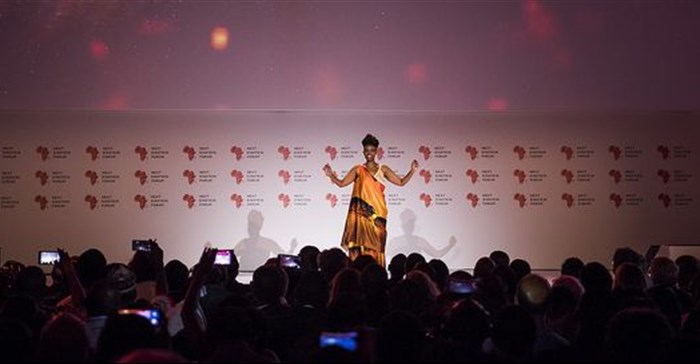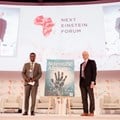Building knowledge-based economies in Africa

The presidential panel that opened Day 2 of the 2018 Next Einstein Forum (NEF) Global Gathering in Kigali lifted the level of debate at the conference a notch higher as policymakers and scientists grappled with the practical implications of creating knowledge-led societies.
President's Macky Sall of Senegal and President Paul Kagame of hosts Rwanda, led the discussion, reflecting on past policies and future plans necessary to nurture the creative, skilled and populations that will form the bedrock of knowledge-led economies.
The white paper on which the discussion focused was jointly prepared by the NEF, the Sustainable Development Goals Centre for Africa, the African Academy of Sciences and Carnegie Mellon University Africa.
President Sall called on African states to balance the focus on improving the quality of science and STEM subjects in higher education, with policy reforms that were able to attract foreign investment into the technology sectors.
"We need to have similar public private partnerships like those you see here at NEF. African states also need to believe in technology. Technology is what separates states today. Africa cannot be absent from the world stage in terms of innovation," said Sall, citing India and Japan as successful examples of the approach.
The white paper proposes specific public policies for states to accelerate innovation and build a knowledge-based development model under the umbrella of three pillars: regulatory framework; skills and capacity; and finance and partnerships.
Sall's call for open and visionary leadership was echoed by Kagame as well as NEF founder and Chairman Thierry Zomahoun.
Kagame said his government's focus on investment in ICT sector and supporting education and research in the field was because science touched every aspect of economy.
"Maybe I shouldn't be a Zuckerberg, but the one to enable others to become like Zuckerberg", President Kagame said in response to clarifying the one wish he had for African technology.
Future innovators
The NEF's next group of fellows were unveiled on the day and audience given a peak into their research and practical application of their projects.
The NEF fellowship programme recognises Africa's best young scientists and technologists, providing them access to its vast network for support, connections, and counsel to advance their work.
Projects ranged from genome modification aimed at improving plant and crop resilience, to nanotechnology applied to pharmaceutical products.
Cameroonian Arthur Zang presented his CardioPad, which uses solar panels to test for heart disease and distribute the diagnosis via Bluetooth or the internet to inner-city hospitals. The innovation with the potential to dramatically reduce the incidence of cardiac related deaths in rural areas.
Other fellows showcasing their projects included a medical jacket that uses algorithms to detect pneumonia in young children, a machine in Liberia that converts palm oil debris into skin care products.
Newly awarded NEF fellow Justus Masa, a Ugandan electrochemist based at the Ruhr University in Germany, highlighted Africa's vast solar power potential and the opportunity to create a new industry around hydrogen batteries.
"We have a resource we are not using in the sun. Solar energy could generate as much as 40,000 megawatts for the continent. Africa has to get ambitious," Masa said.
Circular economy
A discussion on Africa's Low Carbon Circular Economy, found that green energy needed to have strong business case before it could be used to spur faster growth.
The "tap and go" payment system developed by Rwandan Patrick Buchana, which allows for cashless payments for the country's public service and seen bus company revenues jump more than 20%, sent a ripple of excitement through the packed auditorium.
At the session looking at how artificial intelligence can be applied to the health sciences, Professor Abdoulaye Banire Diallo explained how he used AI to decode genomes, harvesting that data through algorithms and machine learning methods to detect, study and monitor pathogens.
"There are already examples in traditional health systems of artificial intelligence systems being used. In Senegal we already monitoring the relationship between tuberculosis and HIV using these systems," said Diallo.
The interface between academic ability and soft skills was explored in the panel titled Learning to Lead, with the panel discussing the need for native tongue instruction in higher education and scientific research to grow the number of scientists on the continent, as well ways to bridge the funding gap.
"We need to think deeper about who are the individuals that could benefit from these kind of projects," said Dr Connie Nshemereirwe of Actualise Africa. "There are a lot of underserved yet critical populations that could really benefit from an expanded view of the whole concept of science leadership."
Where money meets technology
A plea from many of the tech entrepreneurs was for flexible government regulation that was willing to take risks on unprecedented and unusual ideas. Regulation was also a hot topic at the New Fintech Frontier discussion.
Between 300 million and 500 million African people are either unbanked or do not have credit histories that allow them access financial products, while those in formal banking are looking for faster and safer ways to save, invest and borrow money.
Technology alone cannot solve the problem, it has to coupled with regulation that supports innovation.
Enter fintech, driven by blockchain, the widely talked about but little understood technology that has loomed large at the conference as NEF looked bring fintech practitioners closer to the policymakers who regulate spaces in which they operate .
“Where the money meets the technology, that's what you call fintech," said Rwanda Finance Minister Claver Gatete. "The speed at which fintech is developing is amazing, that's one of the reasons we have a $100 million innovation and we want to bring up to $1 billion."
Rose Muturi of Tala, a smartphone app using alternative data like potential clients digital habits to formulate a credit score and deliver instant credit to them, said regulation had to catch up because fintech overlapped between banking, the consumer sector and many other sectors.
"We look at the way you use your smartphone. Everything you do on it, that forms part of your digital footprint.
"Where you spend your time online to how you save names on your phone ... these pieces of data can tell us whether you're a fraudster or not," she explained.
The company has given loans to 1.5 million people worth around $300 million since launching three years ago.
Data driven solutions big and small, the panel found, was indeed the next frontier. The NEF Global Gathering concluded on March 28.
Launched in 2013, the Next Einstein Forum (NEF) is an initiative of the African Institute for Mathematical Sciences (AIMS) in partnership with the Robert Bosch Stiftung. The NEF is a platform that connects science, society and policy in Africa and the rest of the world - with the goal to leverage science for human development globally.
The NEF believes that Africa's contributions to the global scientific community are critical for global progress. At the centre of NEF efforts are Africa's young people, the driving force for Africa's scientific renaissance. The NEF is a unique youth-driven forum.







